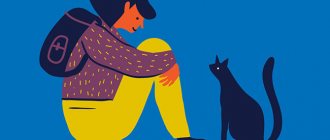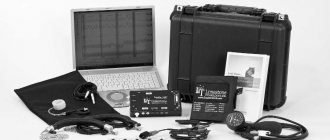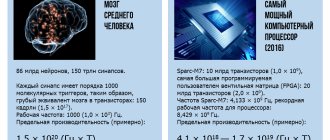Many people have heard that a person only uses 10% of his brain. And these few percentages are enough for the development of information technology, medicines, space exploration and much more. Imagine how life will change if a person starts using his brain to the maximum. But are we really using only a small part of our resources? Let's find out in this article.
Take free logic, idea generation, memory and critical thinking tests now to see how well you use your brain.
What part of the brain does a person use?
It is the brain that determines how a person perceives the world around him. On average, it weighs about 1.5 kg and consists of 100 billion neurons - cells that perceive and transmit information [1].
Content:
- What part of the brain does a person use?
- How did the myth of 10% come about?
- Is it possible to improve brain function?
- Other common myths
- Interesting Facts
As a recent survey of American scientists showed, almost 56% of their compatriots believe that Homo Sapiens uses only 10% of its brain [2]. And we must admit, this belief is very widespread not only in the United States. In fact, this is nothing more than a myth, and neurologists debunked it long ago. Most of the organ is active almost all the time [3]. Scientists conducted research on this topic back in 2009 [1].
Using the capabilities of functional MRI, specialists measured the activity of the organ during the performance of various tasks, and determined that most of the brain remains active almost constantly, even when a person performs very simple actions. Moreover, the organ is awake even when a person is resting or sleeping. But the exact percentage of organ cells that are activated varies from person to person. This indicator also changes depending on what a person does or thinks about.
Load level
Let's give an example. Let's say a mathematics graduate and a thirty-year-old alcoholic were given the same task: multiply 63 by 58. The action is not at all difficult, but which of them will have to use a larger percentage of the brain to carry it out? It is not surprising to guess that the second one. And why? Because a mathematician is smarter? Not at all. He is simply more trained in this matter, and to solve the example he needs much less workload. However, initially both one and the other person have approximately equal opportunities. And the number of neurons is also approximately the same. The difference is only in the number of relationships between them, but, as you know, broken connections can be restored and even acquired new ones. Therefore, an alcoholic certainly has opportunities for intellectual growth.
How did the myth of 10% come about?
The myth that the human brain only works at 10% capacity is so widespread and has existed for so long that today it is even difficult to accurately determine its original source.
Supposedly, it all started in 1907, when the journal Science published an article by psychologist and writer William James, in which he argued that a person uses only part of his mental resources. True, the scientist did not mention in the article exactly what percentage of his brain Homo Sapiens uses [4]. But where exactly that notorious 10% was mentioned was in Dale Carnegie’s book “How to Win Friends and Influence People,” which was published in 1936. This myth was mentioned as something that a professor at the college where he studied said Carnegie.
By the way, according to scientists, neurons occupy approximately 10% of all brain cells [1]. It is quite possible that it was this information that contributed to the emergence of a myth that continues to be replicated, further strengthening a person’s faith in it.
Now you understand what the catch is!
A few words about such a concept as “déjà vu”. This is when you experience the feeling that you have already been in “this” place, with these people, etc., in short, an almost exact repetition of past events. This is the very “awakening of sleeping” neural connections + a little imagination. You might have had a dream that you have long forgotten, but then a very similar situation happens. When neurons have found a match for visual, auditory, sensory characteristics in other neurons, but these connections are weak and you can only feel, due to neurotransmitters, that “this has already happened somewhere.”
Is it possible to improve brain function?
As with any other organ, the condition of the brain directly depends on a person’s diet and activity. By maintaining a healthy lifestyle, you can actually improve its functioning.
Effect of diet
Poor nutrition can worsen a person’s health and cause the development of heart disease, obesity, and type 2 diabetes. And these diseases, in turn, increase the risk of dementia.
To improve brain health, you should include the following foods in your diet:
- dark-skinned plant foods (such as blueberries, broccoli, spinach), as they contain a lot of vitamin E, and red peppers and sweet potatoes are rich in beta-carotene, both of which are extremely beneficial for the brain;
- fatty fish (salmon, tuna, mackerel) are excellent sources of Omega-3 fatty acids, which improve cognitive function;
- walnuts, pecans (antioxidants contained in nuts also have a beneficial effect on brain health).
Physical activity
The role of physical activity in maintaining brain health cannot be underestimated. It is enough to devote at least 30 minutes to active walking every day to reduce the risk of deterioration in brain function. Swimming, jogging, and cycling are also beneficial.
Mental training
The brain works on the principle of muscles: the more actively it is used, the better it performs its functions. Therefore, you should not ignore special mental training to maintain organ health. By the way, according to one scientific experiment, people who are passionate about logical tasks are 29% less likely to develop dementia [5].
Result:
- The entire brain works (if you are healthy), but there is a huge scope for activity in terms of increasing its productivity.
- The brain has enormous potential and an exciting future lies ahead.
- The less we use something, the faster we will forget how to do it.
- Under living conditions, the brain uses more neurons than in a strictly rule-bound game, such as Go or chess.
Well! Increase efficiency, learn. Remember that it is much easier to restore knowledge than to create new ones, so do not be afraid to weaken old neural connections.
Other common myths
Besides the 10% myth, there are many other misconceptions about the human brain. But most of them already have a scientific refutation.
Left and right hemisphere
Many people have probably heard that creative people have a dominant right hemisphere, while people with a logical type of thinking have a dominant left hemisphere. However, recent research shows that all this is nothing more than a myth. If a person is healthy, both hemispheres are equally developed [6]. The truth is that the hemispheres are actually responsible for performing different types of tasks. Thus, the left controls speech, and the right controls emotions [7].
Effect of alcohol
Long-term alcohol abuse can cause a number of health problems, including problems with the brain. However, it cannot be said that each serving of alcohol kills part of the brain cells - this is a misconception. The damage process is quite complex. For example, it has been proven that if a woman abuses alcohol during pregnancy, there is a high risk that the baby will be born with fetal alcohol syndrome. In people with this disease, the brain is smaller than normal and contains fewer cells. Such children will experience learning difficulties in the future and may have other disabilities.
Best materials of the month
- Coronaviruses: SARS-CoV-2 (COVID-19)
- Antibiotics for the prevention and treatment of COVID-19: how effective are they?
- The most common "office" diseases
- Does vodka kill coronavirus?
- How to stay alive on our roads?
Subliminal messages
There are many misconceptions about so-called subliminal messages and their influence on the human brain. Scientific research has confirmed that information received from the outside during sleep in the form of recorded sounds can cause a certain emotional reaction in a person [8]. But using this method to study foreign languages or other disciplines, as some believe, is inappropriate. Scientific experiments show that this method will help you remember previously known information, but it is impossible to learn new things in this way.
Convolutions
The relief of the human brain consists of grooves and convolutions. There is an opinion that every time a person learns something new, a new convolution is formed on the surface of the organ. But this is a misconception. Convolutions are formed before birth and continue to form in childhood.
Stress destroys nerve cells, which, in turn, are not restored.
Stress is indeed very harmful to the body. If it is strong, uncontrolled, and prolonged, then it can lead to disruption of a variety of systems: nervous, immune, and endocrine. Most likely, the death of nerve cells as a result of stress also occurs.
As for the nerve cells, most likely they are still being restored. In experiments on animals, for example on mice, we definitely see that yes. In the case of humans, it is more difficult to set up experiments to test this, and there is a scientific debate: some researchers believe that the accumulated indirect evidence is enough to be confident that new neurons are appearing. Others say that in children, probably, yes, but in adults, it’s unlikely. However, what is certain is that people at any age actively form new synapses, that is, connections between neurons. This is, in principle, the basis of learning and long-term memory.
Excessive daytime napping is an early sign of Alzheimer's disease.
Drowsiness during the day and, in general, a sharply increased need for sleep is really not a very favorable sign. It is quite possible that this is due to ill health, but it is not necessarily directly related to Alzheimer’s. Sleep is very important for the body, and one of its functions is repair. And the need for sleep really increases when a person gets sick with almost anything. Of the many possible explanations, Alzheimer's disease is far from the most likely. But, indeed, if a person used to sleep normally at night, and then stopped and suddenly began to pass out during the day, then it makes sense for him to consult with doctors and try to understand what could be wrong in the body.
Treatment tactics
Treatment of organic brain damage can be very diverse and depends on the pathogenetic mechanism of development of the damage and the immediate cause.
Treatment of organic brain damage can be surgical and conservative. For example, the development of high intracranial pressure, which poses a threat to life, can be treated both surgically and conservatively. Surgical treatment - the application of a burr hole for brain decompression is applicable in the formation of a severe hematoma due to trauma or hemorrhagic stroke, and conservative therapy is possible with a moderate increase in intracranial pressure without brain dislocation. For conservative therapy, diuretics are used that cause forced diuresis, allowing for the rapid elimination of edema.
Treatment of cerebral artery atherosclerosis can also be either surgical or conservative. Surgical – angiography with the installation of stents to widen the lumen of the arteries. Conservative – antithrombotic therapy and correction of dyslepidemia.
Online trainers and games
Crossword puzzles and printed Sudoku have been replaced by online services for brain development and training. You can choose anything from online puzzles to educational games that analyze your gaming behavior and adapt to your decisions. The most popular are Vikium, Uplift and Bitreynika. What is it for? First of all, doing exercises can just be fun. Secondly, it allows you to escape from everyday stressful situations with health benefits. From a pragmatic point of view, such exercises improve cognitive abilities, which over time will help you solve life and work problems faster, remember the names of colleagues and acquaintances, and remember important family dates.
Memory is capable of erasing memories of mechanical actions.
People are great at erasing memories. All modern neurobiology is well described by the English proverb “Use it or lose it” (“Use it or lose it”). Those neural networks through which we most often send electrical impulses are strengthened. If we don’t do this, then gradually the connections between neurons weaken, and this is the forgetting of information.
Recently, ways to accelerate the process of forgetting using pharmacological influences have been actively studied. It helps treat phobias or post-traumatic stress disorder. There are pills that disrupt the conduction of impulses between neurons in some parts of the brain. If you take such a medicine and at the same time activate a memory of a terrible event, it will be rewritten with disturbances and become weaker. For now, these are experimental techniques, but most likely, in a few years they will begin to be actively used in therapy.










